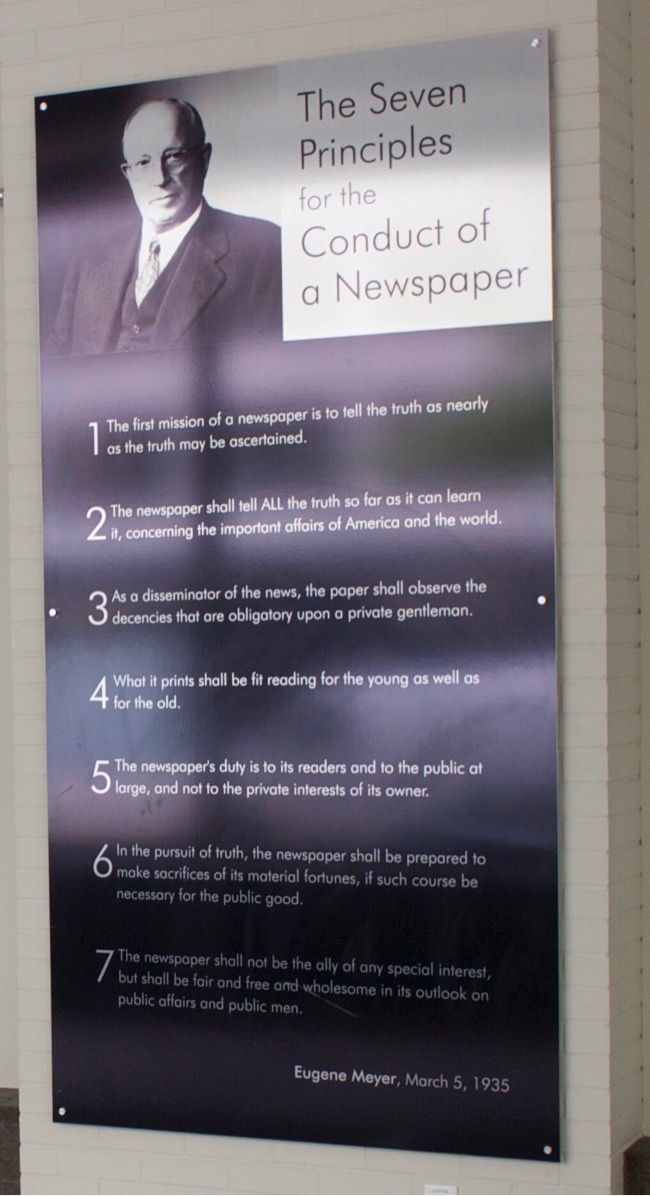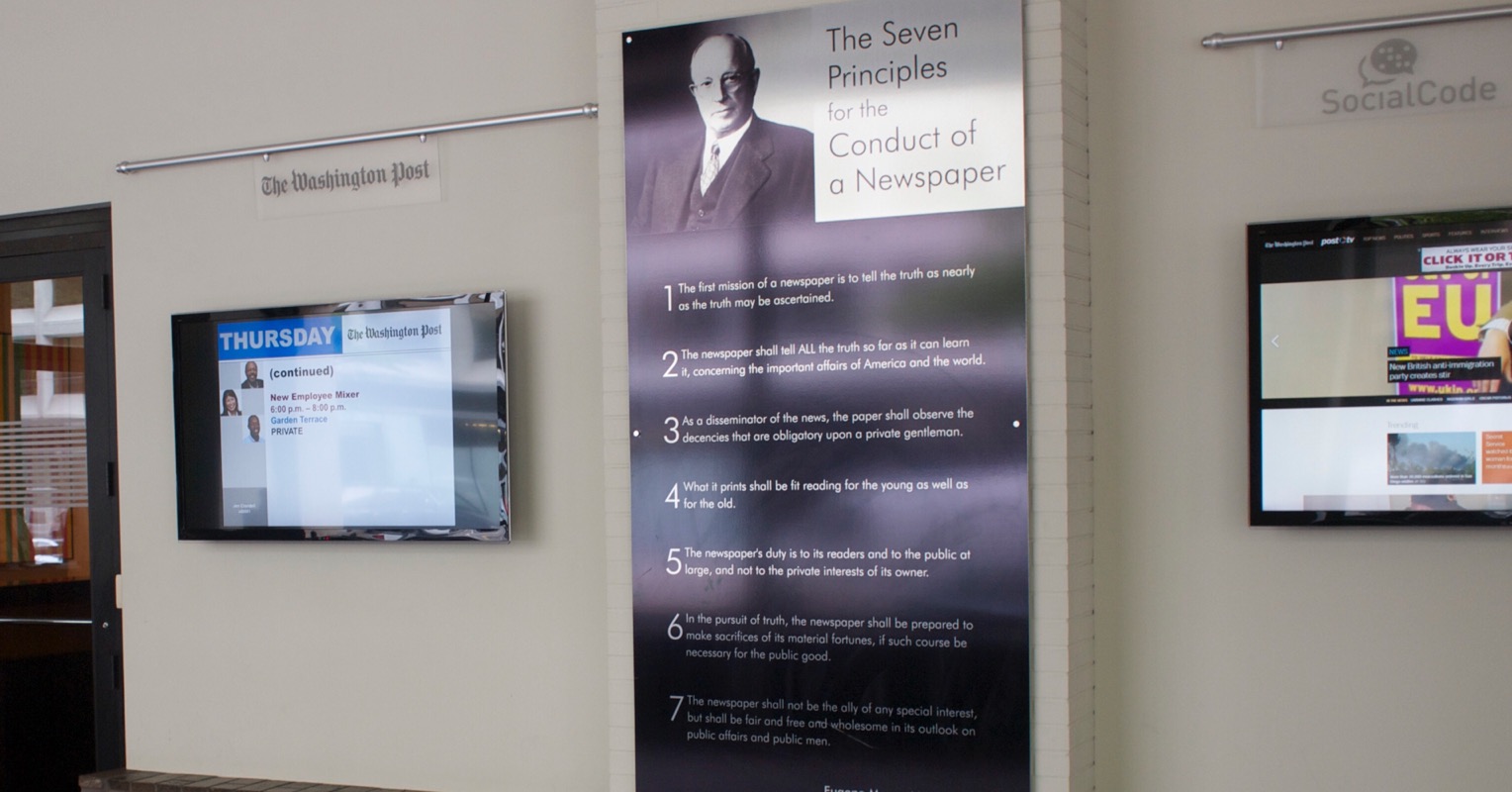An outdated code of conduct
A few years ago, researching a novel, I visited Washington DC. Since the novel is about swashbuckling journalists, I of course entered the lobby of the Washington Post. At the entrance is part of an old printing press, and this code of conduct for the press. I understand that the Post has since moved to another building; I expect they sent the code to a museum in the move, because every item on this list that isn’t outdated has been ignored for decades.
The Seven Principles for the Conduct of a Newspaper
- The first mission of a newspaper is to tell the truth as nearly as the truth may be ascertained.
- The newspaper shall tell all the truth so far as it can learn it, concerning the important affairs of America and the world.
- As a disseminator of the news, the paper shall observe the decencies that are obligatory upon a private gentleman.
- What it prints shall be fit reading for the young as well as for the old.
- The newspaper’s duty is to its readers and to the public at large, and not to the private interests of its owner.
- In the pursuit of truth, the newspaper shall be prepared to make sacrifices of its material fortunes, if such course be necessary for the public good.
- The newspaper shall not be the ally of any special interest, but shall be fair and free and wholesome in its outlook on public affairs and public men.
Eugene Meyer, March 5, 1935
Eugene Meyer founded the Post—I learned this from David Halberstam’s gigantic The Powers That Be. Meyer bought it in bankruptcy and built it into the powerful newspaper it is today, before handing it (and his daughter, Katherine) over to Phil Graham.
Some of the rules are still followed, if you add “in the beltway” to the end. The paper still observes the decencies that are obligatory upon a private gentleman in the beltway. That is, while scandals, and even non-scandals, about conservatives are newsworthy national news, scandals about Democrats are private affairs, local news at best.
And, in support of beltway truthiness, the newspaper remains prepared to sacrifice its material fortune when necessary for the good of the beltway.
And much of its opinions are beltway childishness at best.
But the saddest is the seventh. The Post, like much of the national media today, is little more than the public relations arm of the Democratic Party. It is why the White House of Solyndra, of laying bare the secrets of the State Department and Defense, of Benghazi, of the IRS targeting political speech for silencing, of the Veterans Administration killing veterans, of lying about treaties to the Congress that is supposed to discuss them, of selling arms to Mexican drug lords, can be called “scandal-free” by even more partisan pundits.
And why the White House officials involved—as well as the media itself—can claim that any particular scandal is “old news” once the national press finally is forced to report on it—because by then, it is old news.
Meyer’s code is patronizing. That hasn’t changed. But where Meyer’s code of conduct treats the reader as a child who must be educated, the modern media, including the Post, treats the reader as stupid and malicious, an evil that must be deceived and vanquished. Their conduct is a code of silence, manufactured crises, and obfuscation, wherever possible in their self-appointed position as the Democratic Party’s public relations arm.
In response to 2016 in photos: For photos, memes, and perhaps other quick notes sent from my mobile device or written on the fly during 2016.
- Hillary 2.0: Thomas Sowell
- “Yet that key fact was treated by the media as old news, and what was exciting now was how well Hillary 2.0 outperformed the Congressional committee on television. If the corruption and undermining of the American system of Constitutional government eventually costs us our freedom, will the media say, ‘What difference does it make now?’”
- Huma Abedin Was Listed as Editor of Extremist Islamist Journal; Claims She Didn’t Actually Perform Any Duties: Ace at Ace of Spades HQ
- “The media have repeatedly endeavored to whitewash this journal and Abedin's family's medieval views. But reading the journal in actual Arabic—not relying on the claims about what it says from Abedin’s defenders—is illuminating.”
- New Abedin Emails Reveal Hillary Clinton State Department Gave Special Access to Top Clinton Foundation Donors
- “Crown Prince of Bahrain Forced to Go Through Foundation to See Clinton, after Pledging $32 Million to Clinton Global Initiative.” (Memeorandum thread) (Hat tip to Ace at Ace of Spades HQ)
- The Powers That Be
- David Halberstam’s tome about the growth of media power is repetitive, burdensome, it circles itself like an overweight prizefighter attempting to gain the advantage of the mirror, but like the aging boxer is filled with anecdotal glory.
- ‘The Obama administration has been remarkably scandal-free’: Jim Geraghty at National Review Online
- Just how deep in denial do you have to be to write a sentence like, “The Obama administration has been remarkably scandal-free”? (Memeorandum thread)
More Democrats
- Roundup of Reactions to the Democrat’s Latest Corrupt Lawfare
- There can be no comity in the face of corruption the size of New York’s and DC’s. Lawfare is war, and it must be treated like war.
- Illinois Nazis and Lincoln’s Democrats
- An anecdote about other people’s money and other people’s time that I’ve had sitting around for a while.
- The Life of Stephen A. Douglas
- Where Abraham Lincoln’s conservative principles made a flawed man better, Stephen A. Douglas’s belief in the responsibility of government elites for managing lesser men made him far worse.
- Slavery is barbarism
- Of course progressives believe slavery is a net economic positive. When the left talks rights, they’re talking about the power of government to force people to both provide something and to deny it.
- The left’s vicious racial shaming
- The left is waging a war against struggling mothers—all in service of creating racial discord and shoring up their identity politics.
- 17 more pages with the topic Democrats, and other related pages
More media bias
- The ruling class’s unexpectedly old clothes
- I recently ran across early use of “unexpectedly” for a conservative’s strong economy, referring to the early 1981 market recovery under President Reagan.
- COVID Lessons: Journalistic Delusions and the Madness of Politicians
- COVID-19 was real. The crisis surrounding it was entirely manufactured. Everything we did took a manageable disease and turned it into a killer. And the very worst was believing a media we knew was lying.
- How many fingers, America?
- The Orwellianization of the left continues.
- Has Trump forced the media into a Kobayashi Maru?
- The Kobayashi Maru is that the media wants to be able to continue lying and be believed. People don’t distrust them because of Trump. People distrust them because they keep lying. It is a self-caused problem.
- The institutional forgetfulness of the press
- We no longer have to rely on the press as our institutional memory. The Internet has made it harder for the left to pretend the past doesn’t exist, or to say one thing here and another there.
- 34 more pages with the topic media bias, and other related pages
More Washington Post
- The Hillary Clinton e-mail ‘scandal’ that isn’t
- There’s no there here, and it doesn’t affect her campaign. Nothing in the law says felons can’t be President.
- Wife offers no apology after husband beats her
- Social change reporter blames victims for attacks, says free speech isn’t worth defending.
- The child sex of the anointed
- There’s nothing so uncommon as common sense in DC, and the Washington Post epitomizes the nonsensical vision of the anointed with Betsy Karasik’s article proposing legalizing sex between high school teachers and high school students “absent extenuating circumstances”.
- April fools came early at the Washington Post
- The left-wing media have been omitting the truth for so long, they no longer remember the omissions.



